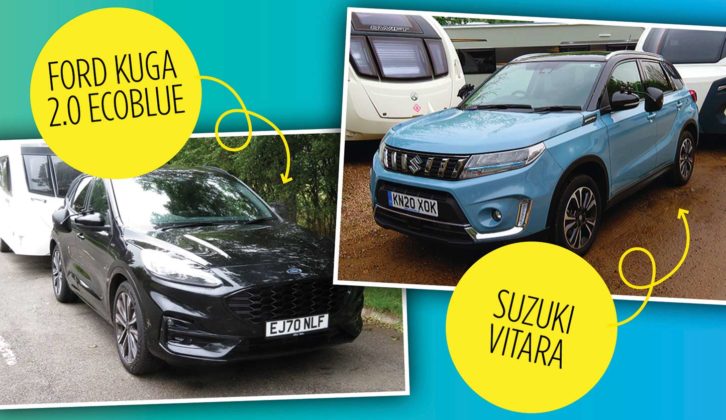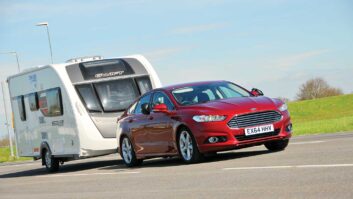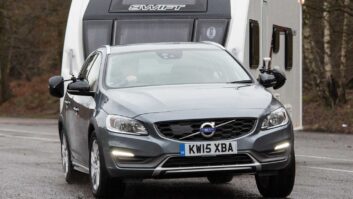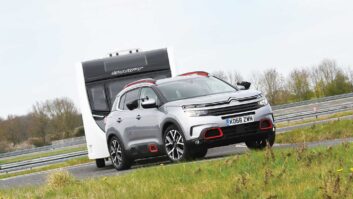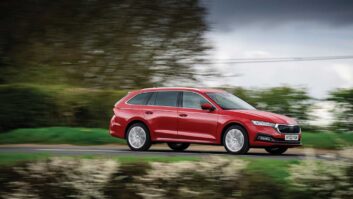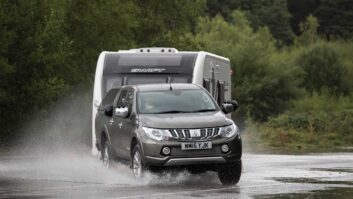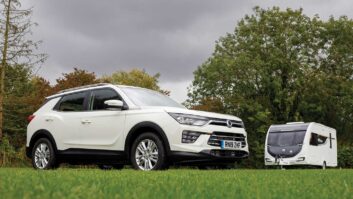The best tow cars for caravans provide stability, comfort and a smooth driving experience. However, choosing the perfect tow car isn’t always easy; there are a wide array of vehicles out there, from a number of well-known brands. Luckily, we’re here to assist. To help you pick out the car for you, we’re taking a look at two cars from two popular manufacturers – the Suzuki Vitara and the Ford Kuga.
The Ford Kuga we’re looking at is the 2.0 EcoBlue mild hybrid – it promises to stretch a gallon of diesel for over 50 miles – while the Suzuki has increased its fuel economy by 15% and offers both two-and-four-wheel-drive versions.
How do these two compare? We find out…
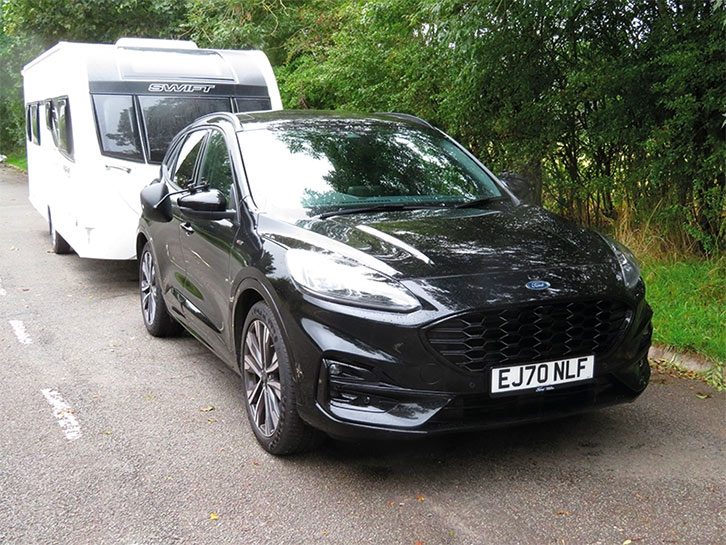
Ford Kuga 2.0 EcoBlue 150PS MHEV ST-Line X FWD
- Price: £33,505
- Engine size: 1997cc
- Kerbweight: 1680kg
- Maximum towing limit: 1900kg
- Power: 150bhp
- Torque: 275lb ft
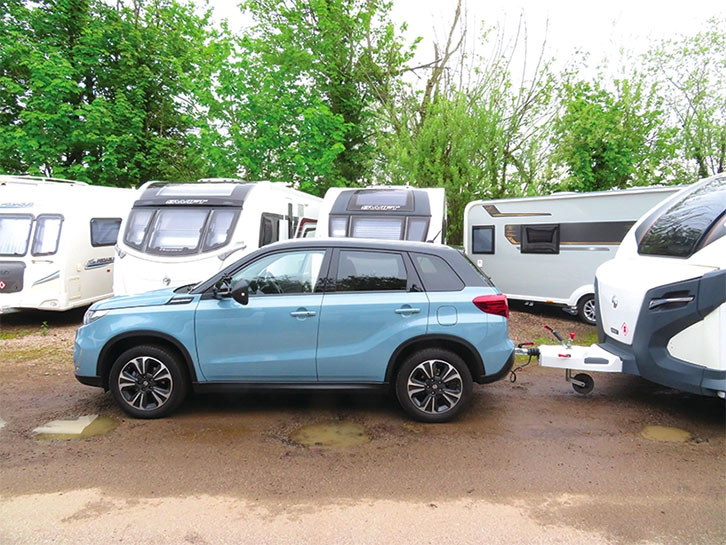
Suzuki Vitara
- Price: £27,049
- Engine size: 1373cc
- Kerbweight: 1350kg
- Towing limit: 1200kg
- Power: 129bhp
- Torque: 173lb ft
Ford Kuga vs Suzuki Vitara: what can they tow?
The Vitara 1.4 Boosterjet Allgrip we tested is a 4×4 and it’s one of the lightest of its kind. It comes with a kerbweight of 1350kg, meaning you only get an 85% match figure of 1148kg. This somewhat restricts the tourers you can match it with, although if you already have a lightweight caravan, that isn’t going to be an issue.
In comparison, the Ford Kuga we tested is a mild-hybrid front-wheel drive. It has a respectable kerbweight of 1680kg, meaning it has an 85% match figure of 1428kg. This could provide you with some useful extra flexibility when picking a caravan to tow.
Ford Kuga vs Suzuki Vitara: towing ability
When it comes to towing, the Vitara was able to pull a caravan with a MiRO of 1050kg without difficulty, even if torque and power outputs are modest.
Hill starts on a 1-in-10 slope are simple to negotiate too, with a manual handbrake keeping it in place.
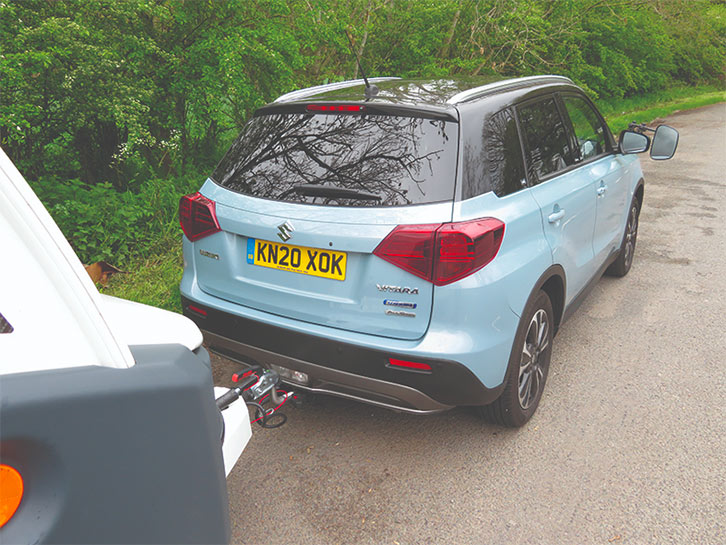
While pulling away does require a number of revs (we were surprised, as it’s more than you expect when towing with a diesel), the Allgrip 4×4 system the Suzuki comes with allows you to drive smoothly. It’s also pleasant to drive at speed on a motorway – we found that overtaking a lorry was no issue, even at 60mph.
When we tested it, we matched the Ford to a tourer with a MiRO of 1306kg. The tow car was quickly able to get up to speed, and could accelerate without any problem when pulling away from junctions.
Our tow car had sports suspension fitted as standard, ensuring a firm set-up. This meant the car had no problem navigating country roads, even while towing.
We did find the caravan moved in the crosswinds a little bit when we were on A-roads and motorways, although it was a windy day when we tested it, and it was uncommon for this to require any correction.
However, another difference between the two cars becomes apparent when taking the front-wheel drive into account. We found a 1-in-10 slope caused the momentary spinning of the front wheels when we tried the Ford in damp conditions.
This could be a consideration if you’re planning to stay somewhere on a grassy pitch, although hardstanding shouldn’t pose an issue.
Ford Kuga vs Suzuki Vitara: solo driving
The Vitara’s small size makes it ideal for navigating urban streets, and we think it handles well. It’s also comfortable, with only the sharpest of bumps proving any issue. The Allgrip 4×4 system really won’t be noticed most of the time, but it’s comforting to know it’s there if necessary. If you keep the system in auto, it can decide for you whether to stick to two or four wheel drive.
The Kuga is also a pleasure to drive, with sports suspension ensuring it’s a nimble operator. Firm suspension does mean any bumps are felt, but it’s fast to accelerate.
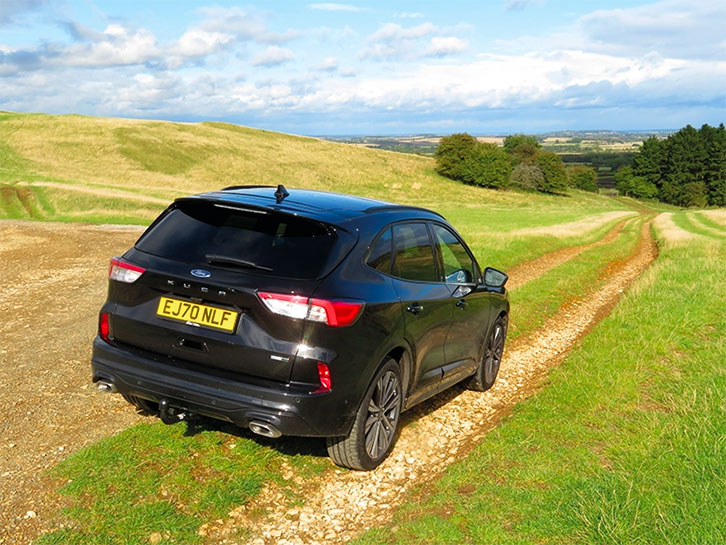
Ford Kuga vs Suzuki Vitara: practicality
We think the Vitara is quite practical for a compact SUV, providing good legroom for anyone sitting in the back. However, headroom is a bit of an issue, with adults possibly finding their heads will be brushing the ceiling.
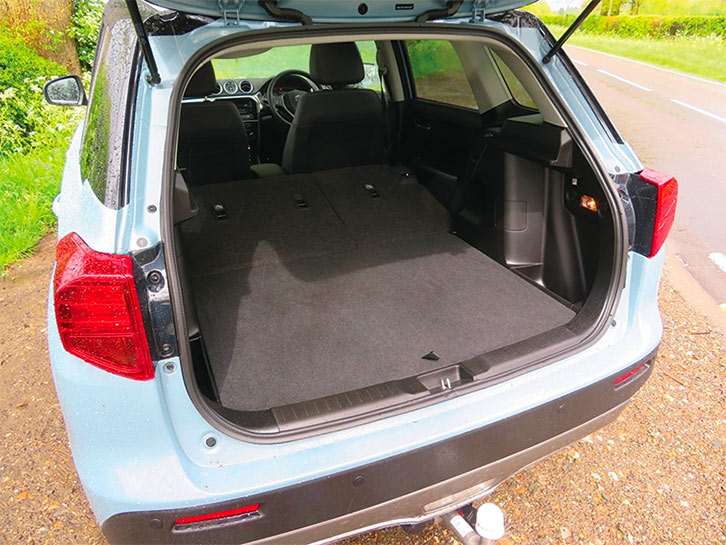
The boot offers 375 litres if the rear seats are upright, and this can be increased to an impressive 710 litres if they’re folded.
When it comes to the Kuga, there is fractionally more boot space on offer, with 412 litres available. However, you only have the option of increasing this to 526 litres if you slide the rear bench forward.
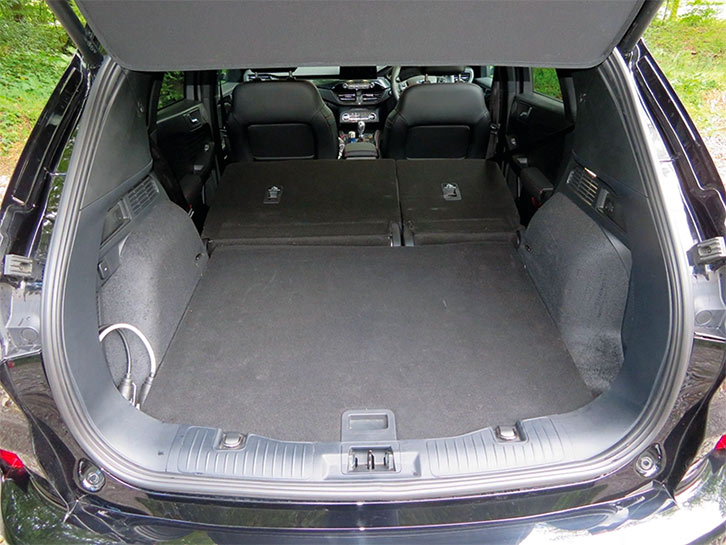
Unlike the Vitara, the Ford has a spacious interior with good head and legroom available, even in the rear seats. The air vents will also keep you cool throughout. However, we think the inside is a bit disappointing, considering the price tag.
Ford Kuga vs Suzuki Vitara: buying
The Kuga 2.0 EcoBlue ST-Line X comes in at £33,505 and we think it’s decently kitted out. It includes heated seats, 19-inch alloys, climate control and artificial leather seats as standard.
In comparison, the Vitara comes in at £27,049, and has plenty of kit on offer, including 17-inch alloys, sat nav, suede upholstery, front and rear parking sensors, and a rear-view camera.
Ford Kuga vs Suzuki Vitara: fuel efficiency
Fuel economy will always be an important consideration, and this is an area where the Kuga truly shines. We found the official combined economy figure of 55.3-57.6mpg to be broadly achieveable, while we thought the 31.6mpg we achieved while towing was great.
In contrast, the Vitara has an official combined economy figure of 45.4mpg with a manual gearbox – when towing, we found 27.6mpg.
Verdict
The Vitara is incredibly stable, and we think it’s an impressive lightweight tow car. On the other hand, the Kuga offers excellent fuel-efficiency. Both are also well-suited to solo use too.
When it comes to deciding between the two, a couple of the key considerations will be the size of your caravan and when you intend to tour. If you have a bigger caravan, the Ford is likely to be the way to go.
However, the value of the Vitara is also an attractive element. It’s £6,000 cheaper than the Kuga, and the tow car comes with plenty of kit as standard too. if you have a lightweight caravan and plan to tour all year round, when conditions could be wet and muddy, the Allgrip 4×4 system on offer in the Vitara and the very reasonable price could be the deciding factor.
You can find out more about both cars in our review of the Ford Kuga and the Suzuki Vitara.
Looking for a caravan instead? Then why not see how the Adria Adora Tiber and the Bailey Phoenix 440+ got on in our four berth showdown.
If you’ve enjoyed reading this article, why not get the latest news, reviews and features delivered direct to your door or inbox every month. Take advantage of our brilliant Practical Caravan magazine SUBSCRIBERS’ OFFER and SIGN UP TO OUR NEWSLETTER for regular weekly updates on all things caravan related.
